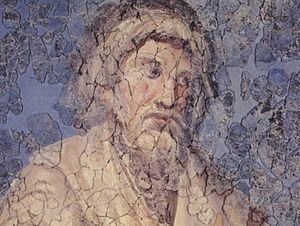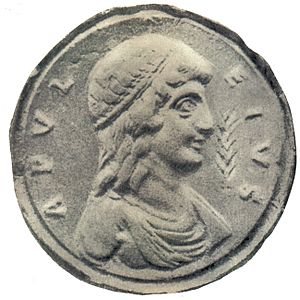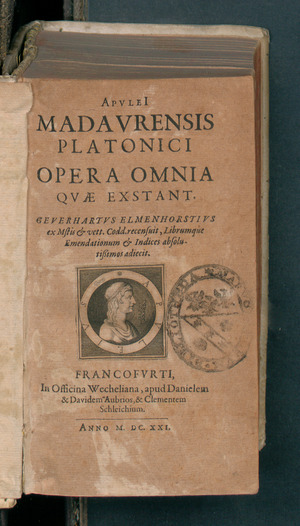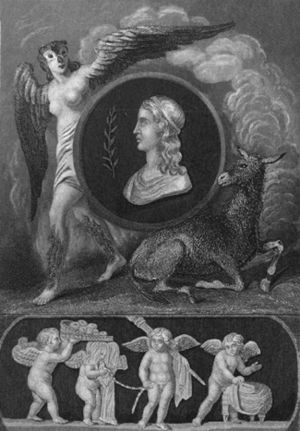Apuleius facts for kids
Quick facts for kids
Apuleius
|
|
|---|---|

Late antique ceiling painting c. 330, possibly of Apuleius
|
|
| Born | c. 124 Madaurus, Numidia
|
| Died | c. 170 (aged 45–46) |
|
Notable work
|
The Golden Ass |
| School | Middle Platonism |
|
Influences
|
|
|
Influenced
|
|
Apuleius (also known as Lucius Apuleius Madaurensis) was a famous writer, philosopher, and speaker from ancient Numidia. He was born around 124 AD in the city of Madauros, which is now M'Daourouch, Algeria. Apuleius studied Platonism (a type of philosophy based on the ideas of Plato) in Athens. He also traveled a lot to places like Italy, Asia Minor, and Egypt. He joined several ancient religious groups called mysteries.
One of the most famous events in his life was when people accused him of using magic. They claimed he used spells to make a rich widow fall in love with him and get her money. Apuleius gave a powerful speech to defend himself in court. This speech is known as the Apologia.
His most well-known book is a novel called Metamorphoses, also known as The Golden Ass. It's the only full Latin novel that still exists today. The story is about a character named Lucius who tries magic and accidentally turns into a donkey. Lucius has many adventures as a donkey before the goddess Isis helps him become human again.
Apuleius's Life Story
Apuleius was born in Madauros, a Roman town in Numidia, North Africa. He once said he was "half-Numidian half-Gaetulian." Madauros is also where Augustine of Hippo, another famous writer, went to school later on. Today, you can still see some impressive Roman ruins there. We know about Apuleius's life mostly from his defense speech, the Apologia, and another work called Florida, which contains parts of his speeches.
His father was an important local official. When his father died, he left a lot of money to Apuleius and his brother. Apuleius went to school in Carthage and then in Athens. In Athens, he studied Platonism and other subjects. After that, he went to Rome to learn about public speaking and law. He probably worked as a lawyer for a while before returning to North Africa. He also traveled a lot in Asia Minor and Egypt, studying philosophy and religion. He spent much of his inheritance during these travels.
Apuleius was part of several ancient mystery religions, including the Dionysian Mysteries. He was also a priest of Asclepius, a god of healing.
Later, Apuleius started a trip to Alexandria. On his way, he became sick in the town of Oea (modern Tripoli). A friend from his Athens days, Sicinius Pontianus, welcomed him into his home. Pontianus's mother, Pudentilla, was a very wealthy widow. With his friend's encouragement, Apuleius decided to marry Pudentilla.
However, some of Pudentilla's relatives were not happy about this marriage. They didn't want her wealth to leave the family. So, they accused Apuleius of using magic to make Pudentilla marry him. The court case happened around 158 AD in Sabratha, near Tripoli. The judge was Claudius Maximus, a high-ranking Roman official. Apuleius gave a strong speech to defend himself, which is still famous today as the Apologia. He won the case.
We don't know much about Apuleius's life after this trial. He wrote many books and gave public speeches that were very popular. He was also in charge of organizing gladiatorial games and wild animal shows. Statues were even put up in his honor in Carthage and other cities. We don't know exactly when or where Apuleius died, but he was active until at least 170 AD.
Apuleius's Books
The Golden Ass
The Golden Ass, also called Metamorphoses, is the only complete Latin novel we have from ancient times. It's a very creative, funny, and adventurous story. It follows a character named Lucius, who says he is related to famous philosophers. Lucius tries to use magic but accidentally turns into a donkey. As a donkey, he sees and hears many strange things. He finally escapes his donkey form in a surprising way.
Inside this main story, there are many smaller stories. The most famous one is the tale of Cupid and Psyche. This is a rare example of an ancient fairy tale that has survived in a written book.
The Golden Ass ends with Lucius, now human again, wanting to join the mystery religion of Isis. He follows special rules, cleanses himself, and learns the secrets of the cult. He then goes through an initiation process, which involves a journey that feels like going to the underworld. Later, Lucius also joins the cult of Osiris in Rome and becomes a priest serving Isis and Osiris.
The Apologia
The Apologia is the speech Apuleius gave to defend himself in court. This happened in Sabratha around 158–159 AD. He was accused of using magic. His defense speech had three main parts:
- First, he argued against the claims about his personal life. He showed that he married Pudentilla for love, not for her money. He also proved he was smarter and more moral than his accusers.
- Second, he explained that his so-called "magic" was actually scientific experiments or religious acts. He said he was just following the ideas of philosophers like Aristotle and Plato.
- Third, he described everything that happened in Oea since he arrived. He used these details to show how weak the arguments against him were.
The Apologia is important because it tells us a lot about Apuleius himself. It also gives us information about beliefs in magic and daily life in Roman Africa during the second century.
Other Writings
Apuleius wrote several other important works:
- Florida: This book is a collection of 23 short pieces from his various speeches and lectures.
- De Platone et dogmate eius (On Plato and his Doctrine): This book explains Plato's ideas about physics and ethics. It also includes a short biography of Plato.
- De Deo Socratis (On the God of Socrates): This work talks about daemons. Daemons were believed to be spirits that acted as messengers between gods and humans. This book was criticized by Augustine of Hippo.
- On the Universe: This is a Latin translation of an older Greek work called De Mundo. Many scholars believe Apuleius translated it.
Apuleius wrote many other books that have not survived. These included poetry and fiction. He also wrote technical books about politics, trees, farming, medicine, nature, astronomy, music, and math. He even translated Plato's Phaedo.
See also
 In Spanish: Apuleyo para niños
In Spanish: Apuleyo para niños
- Boethius
- Square of opposition
 | John T. Biggers |
 | Thomas Blackshear |
 | Mark Bradford |
 | Beverly Buchanan |




